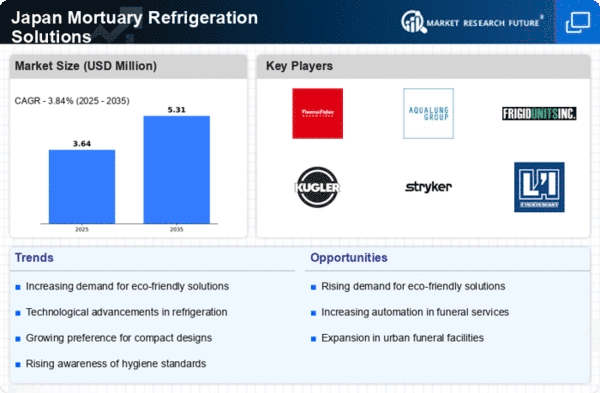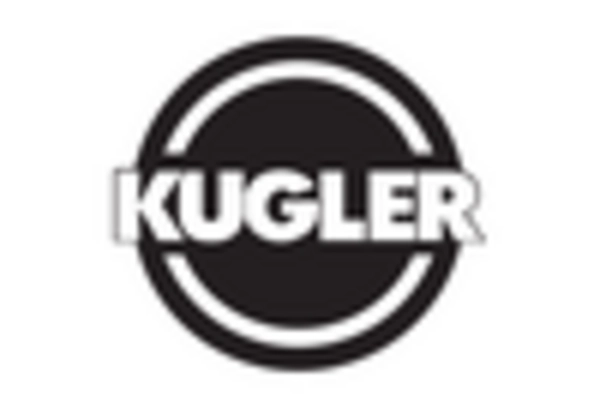Regulatory Standards and Compliance
Regulatory standards in Japan regarding the handling and storage of deceased bodies are a significant driver for the mortuary refrigerator market. Compliance with health and safety regulations necessitates the use of high-quality refrigeration systems to ensure proper body preservation. The mortuary refrigerator market must adhere to stringent guidelines set forth by health authorities, which often require specific temperature ranges and storage conditions. As regulations become more rigorous, mortuary service providers are compelled to invest in advanced refrigeration technologies that meet these standards. This compliance not only ensures the dignity of the deceased but also protects public health, thereby driving the demand for reliable mortuary refrigeration solutions.
Cultural Shifts Towards Funeral Practices
Cultural shifts in Japan regarding funeral practices are influencing the mortuary refrigerator market. Traditional practices are evolving, with an increasing number of families opting for cremation and memorial services. This shift necessitates the need for mortuary refrigerators to store bodies prior to cremation, especially in urban areas where space is limited. The mortuary refrigerator market is adapting to these changes by offering more compact and efficient refrigeration solutions that cater to the needs of modern funeral practices. As societal attitudes towards death and funerals continue to evolve, the demand for specialized refrigeration solutions is likely to increase, driving market growth.
Increasing Investment in Funeral Services
The increasing investment in funeral services in Japan is a notable driver for the mortuary refrigerator market. As families seek more personalized and high-quality funeral options, funeral homes are expanding their services and facilities. This expansion often includes upgrading refrigeration systems to accommodate the growing demand for body storage. The mortuary refrigerator market is likely to benefit from this trend, as more funeral homes recognize the importance of having reliable refrigeration solutions to enhance their service offerings. With the market projected to grow by approximately 5% annually, the investment in modern mortuary refrigeration systems is expected to rise, reflecting the changing landscape of funeral services in Japan.
Technological Innovations in Refrigeration
Technological advancements in refrigeration systems are transforming the mortuary refrigerator market. Innovations such as energy-efficient cooling systems, smart temperature controls, and advanced monitoring technologies are becoming increasingly prevalent. These innovations not only improve the preservation of bodies but also reduce energy consumption, which is a crucial factor for mortuary facilities. The integration of IoT (Internet of Things) technology allows for real-time monitoring of temperature and humidity levels, ensuring optimal conditions for body storage. As a result, mortuary refrigerator market players are investing in these technologies to enhance service quality and operational efficiency. The market is expected to grow as more facilities adopt these advanced refrigeration solutions, leading to improved standards in body preservation.
Aging Population and Increased Mortality Rates
The aging population in Japan is a critical driver for the mortuary refrigerator market. As the demographic shifts towards an older age group, the mortality rates are expected to rise. This trend necessitates an increase in the demand for mortuary services, including the need for advanced refrigeration solutions. According to recent statistics, the population aged 65 and older is projected to reach 36% by 2040. This demographic change indicates a growing requirement for mortuary refrigerators to preserve bodies for extended periods, thereby enhancing the operational efficiency of funeral homes and mortuaries. The mortuary refrigerator market is likely to experience significant growth as facilities adapt to these demographic shifts, ensuring they are equipped to handle the increasing number of deceased individuals.

















